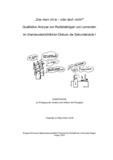Citation link:
http://dx.doi.org/10.25819/ubsi/10379Files in This Item:
| File | Description | Size | Format | |
|---|---|---|---|---|
| Dissertation_Seidl_Sabine.pdf | 2.59 MB | Adobe PDF |  View/Open |
| Dokument Type: | Doctoral Thesis | metadata.dc.title: | „Das mein ich ja – oder doch nicht?“ - Qualitative Analyse von Redebeiträgen von Lernenden im chemieunterrichtlichen Diskurs der Sekundarstufe I | Authors: | Seidl, Sabine | Institute: | Department Chemie - Biologie | Free keywords: | Mündliche Fachkommunikation, Sprachsensibilität, Chemiedidaktik, Chemistry instruction, Oral communication | Dewey Decimal Classification: | 540 Chemie | GHBS-Clases: | UYK UZS |
Issue Date: | 2023 | Publish Date: | 2023 | Abstract: | Eine qualitätsvolle Kommunikation von Lernenden stellt einen wichtigen Bestand-teil des Chemieunterrichts dar. Die chemische Fachsprache ist jedoch Lernmedium und Lernziel zugleich. Der Erwerb führt unweigerlich zu Verständnis- und Formulie-rungsschwierigkeiten. Eine Untersuchung (fach )sprachlicher Formulierungen in den Redebeiträgen unter Fachperspektive ist folglich ein klares Forschungsdeside-rat, gerade weil die Qualität der Redebeiträge der Lernenden nachdenklich stimmt: Die Antworten bestehen häufig aus weniger als drei Wörtern, die häufig weder eine fachgerechte verbale Ausdrucksweise aufweisen noch Rückschlüsse auf den Inhalt zulassen. Eine Verbesserung des aktiven mündlichen Unterrichtsdiskurses im vor-wiegend mündlich geprägten Fach Chemie birgt hohes Potenzial in sich, zu einer nachhaltigen Lernertragssteigerung beizutragen. Dieses Promotionsvorhaben generierte eine Bestandsaufnahme (fach )sprach-licher Stolpersteine im wenig beforschten Bereich der mündlichen Sprachhandlun-gen von Lernenden im Chemieunterricht der Sekundarstufe I. Die Daten der vorlie-genden Arbeit wurden im chemieunterrichtlichen Schulalltag im Rahmen von Leit-fadeninterviews in fünf Klassen aus zwei österreichischen Schulen im qualitativen Ansatz akquiriert. Die Ergebnisse weisen auf drei große Bereiche (fach )sprachlicher Herausforde-rungen hin: unklare Referenzen zwischen Verweis- und Bezugswörtern, problema-tische Wechsel zwischen den chemischen Konzeptebenen nach Mahaffy und eine ambivalente Verwendung des Begriffs Element. Quality communication of learners has become a fundamental part of chemistry ed-ucation as the scientific language of chemistry is both a study goal and a study tool. Therefore, its acquisition inevitably leads to phrasing difficulties and misunderstand-ings. These challenges are even more evident when it comes to speech communi-cation. The speech communication quality of learners in chemistry lessons is indeed con-cerning; in general, learners’ answers consist of fewer than three words. They con-tain neither adequate terminology nor is it possible to draw coherent conclusions about the chemistry content from them. Consequently, it is a clear desideratum of research to analyse the learners’ usage of both the scientific language of chemistry and the wording. In turn, improving speech communication skills among learners has potential to contribute to improved long-term learning performance, considering the fact that chemistry lessons contain a high amount of speech communication. This doctoral thesis generates a survey of obstacles in the scientific language of chemistry. The research focuses on difficulties in speech communication of second-ary school chemistry learners. Little is known so far in this particular field of re-search. The current data has been acquired in two Austrian schools. Guided inter-views were conducted in five classes. A qualitative method has been applied for data acquisition. Results indicate three major areas of concerns: unclear pronoun-antecedent agreement, problematic shifts between chemical concept levels according to Ma-haffy, and an ambiguous application of the term element. |
DOI: | http://dx.doi.org/10.25819/ubsi/10379 | URN: | urn:nbn:de:hbz:467-25916 | URI: | https://dspace.ub.uni-siegen.de/handle/ubsi/2591 |
| Appears in Collections: | Hochschulschriften |
This item is protected by original copyright |
Page view(s)
267
checked on Nov 30, 2024
Download(s)
97
checked on Nov 30, 2024
Google ScholarTM
Check
Altmetric
Items in DSpace are protected by copyright, with all rights reserved, unless otherwise indicated.

